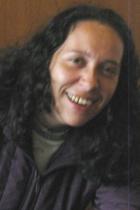Florencia Ruiz Mendoza

Mexico, 2009
Graduate Student, New School
Florencia Ruiz Mendoza, a 2009 HRAP graduate, is Director of Capacity Building for the Social Movements Historical Research Center, an NGO based in Mexico. Trained as a researcher, Ruiz Mendoza shares that her experience at HRAP has taught her how to manage an NGO and how to better understand and meet donor expectations of NGOs and their personnel. Reflecting on the benefits of the program, she states, “Thanks to the professional staff at ISHR, I was able to do a lot of networking in New York City and Washington and I realized how much I can [raise awareness of] our work both in Mexico and internationally.”
Ruiz Mendoza has expressed that the courses she chose to audit significantly contributed to her academic development. The connections she made through Columbia faculty paved the way for opportunities even after her completion of the program. Three months after her participation in HRAP, Ruiz Mendoza was awarded a scholarship from the Oral History Research Office at Columbia University to fund her participation in the Oral History Summer Institute Program. The program themed, “Oral History from the Ground Up: Space, Place and Memory,” focused on analyzing the meaning that space, place and memory have in the production of individual, social, cultural and political narratives.
Ruiz Mendoza shares that the greatest benefit of her participation in HRAP has been, “All the knowledge I [received, and continue to receive] and all the wonderful people I met since then.” To HRAP, she attributes an increased confidence regarding her future professional career and her increased support of her colleagues and the communities they serve. About HRAP’s contribution to her work while in the US, she states, “I had the great opportunity to speak out about the stories of people whose voices have been silenced by the Mexican government.”
Reflecting on her overall experience, she fondly notes, “I will never have enough words to express how grateful I am with HRAP and its staff, it has been so far one of the most important experiences in my life and I will treasure [that] for the rest of my life.”
Since returning to Mexico, Ruiz Mendoza has resumed her duties as a researcher and has been appointed Director of Capacity Building. She was recently invited by both Instituto Mora and Universidad Autonoma de Guerrero to speak on a panel of experts about human rights issues.
—Article composed by Tiffany Wheatland, Program Coordinator, July 2010
January 2014 update: Ruiz Mendoza is currently a graduate student at the New School in New York.






